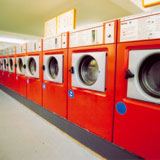Household
Water

Water costs are determined individually depending on usage and the charges are levied with the rent.
Electricity and Gas
Each tenant must register with the local gas or electricity company. The landlord, house management or the house caretaker can tell you who is responsible for supplying the gas and electricity and where you should register. The easiest thing to do is register with your local electricity supplier. But you can also receive electricity from any electricity supplier registered in Germany or any other member state in the European Union. There are often major price differences depending on which company supplies your electricity. You can also choose which kind of electricity you want: environmentally friendly electricity or nuclear, etc.
There are many consumer advice centres that provide information on electricity and costs.
![]() www.billig-strom.de
www.billig-strom.de
![]() www.stromtarife.de
www.stromtarife.de
![]() www.stromtip.de
www.stromtip.de
Oil and Coal Heating
The costs of central heating are also included in the overall rent costs. Single storey heating, coal heating, gas and oil heating are charged separately. The tenant is responsible for payment and insuring that his supplies are adequate.
Garbage

Environmental constraints mean that it is common in Germany to divide garbage into different groups and not throw it all into the same bin. There are normally several different bins in each apartment block. Paper, glass and packaging are often collected separately. Packaging is often labelled with the so-called "Grüner Punkt", a symbol showing that it can be recycled. The same applies for food waste ("Biomüll") that can be turned into compost. Finally, there is "Restmüll" (all other types of rubbish) that do not fall into the other categories. This other rubbish, the "Restmüll", is regularly collected, as is the packaging placed in the yellow container ("Gelber Sack") and the paper, cardboard and glass. However, there are exceptions; certain types of rubbish, the so-called "Werkstoffe", must be handed in to special depots. All types of rubbish that contain poisons or chemicals, such as fridges and paints, have to be taken to specials depots as they cannot be put in the regular rubbish bins. They are referred to as "Sondermüll". These special depots are run by the local refuse disposal companies. Batteries also fall into this category. They can often be disposed of in supermarkets or specialised electrical goods stores.
Old furniture and large electrical goods are picked up by refuse disposal firms and are classified as bulky waste ("Sperrmüll"). The days when such goods are picked up are published in the local town hall or your district office ("Bezirksamt"). Certain boroughs and towns do not have specific days laid down for removing bulky waste. A date can be arranged personally with the garbage disposal firms. Old shoes and clothes can often be disposed of in large containers in towns and cities across Germany. Several times a year the Red Cross and other organisations call on citizens to dispose of their old clothes and donate them to charity. You can find the addresses in the Yellow Pages ("Gelbe Seiten") or at your post office.
Information on the rules of waste disposal can be found at your local town hall.
Washing Clothes

If you do not possess or want to possess a washing machine, many towns and cities have laundrettes, known as "Waschsalons". These laundrettes also provide washing powder ("Waschpulver") to wash your clothes. The prices for washing clothes vary. There are also "Textilreinigungen" (other firms that wash and dry-clean clothes).
